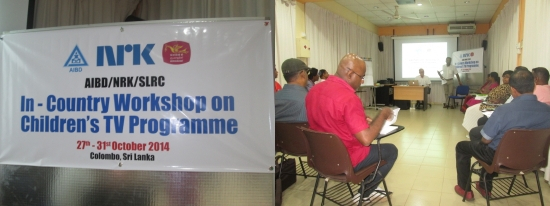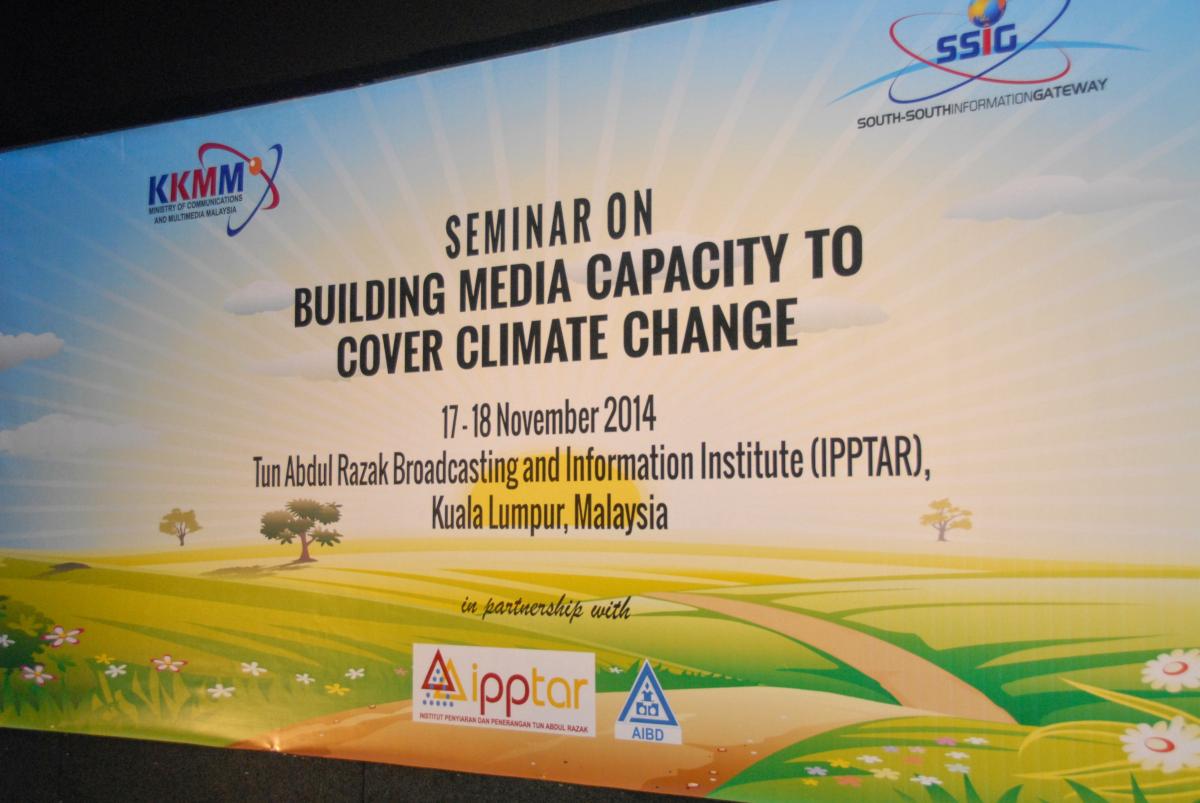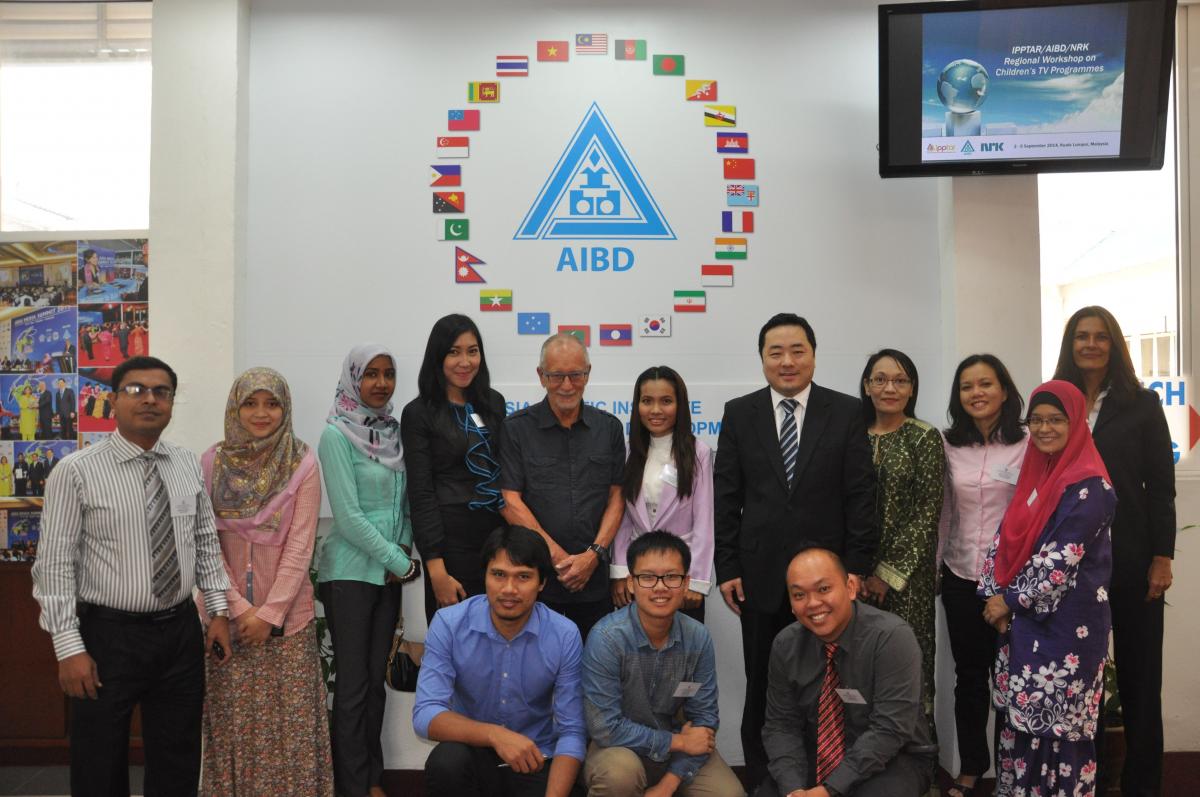From 27 to 31 October 2014, Sri Lanka Rupavahini Corporation (SLRC) hosted an in-country workshop on Children's TV Programme in Colombo, Sri Lanka.
From 27 to 31 October 2014, Sri Lanka Rupavahini Corporation (SLRC) hosted an in-country workshop on Children's TV Programme in Colombo, Sri Lanka.

Thirteen participants, mostly producers, attended this activity which aimed at providing to the participants an introduction to children's perception of media and presenting them working methods to create TV programmes for children.
During the 5 days, participants studied drama, documentary, game show transmedia storytelling, method for pitching and practiced different exercises alone or with a group.
Mr Kalle Furst, Director Fürst & Father, Film and TV Ltd. and Secretary General and organiser of the Nordic Children’s Media Festival was the consultant for this workshop organised by AIBD and supported by NRK.
AIBD/NRK/SLRC In-Country Workshop on Children’s TV Programme
From 27 to 31 October 2014, Sri Lanka Rupavahini Corporation (SLRC) hosted an in-country workshop on Children's TV Programme in Colombo, Sri Lanka.
AIBD/TVRI In-Country Consultation on Social and Emerging Media
AIBD/TVRI in-country consultation on Social and Emerging Media for Broadcast Management was held from 25 - 27 November 2014 in Jakarta, Indonesia.
AIBD/Prasar Bharati/NABM Sub-Regional Workshop on TV Post Production and Graphics
The Sub-Regional Workshop on TV Post Production and Graphics organised by AIBD in collaboration with Prasar Bharati and National Academy for Broadcasting and Multimedia (NABM) was held in New Delhi, India from 17 - 21 December 2014.
IPPTAR/KKMM/AIBD Successful Seminar on Building Media Capacity to Cover Climate Change
The Ministry of Communication and Multimedia, Malaysia (KKMM), in collaboration with the Tun Abdul Razak Broadcasting and Information Institute (IPPTAR) and the Asia-Pacific Institute for Broadcasting Development (AIBD), organised the Seminar on Building Media Capacity to Cover Climate Change in Kuala Lumpur from 17-18 November 2014. Climate change is a global phenomenon with far-reaching ramifications, requiring action from a variety of stakeholders, such as policymakers, civil society and the media.
AIBD/IPDC/UNESCO Regional Workshop on Capacity Building for Safety of Journalists In Central Asian Republics
The Regional Workshop on Capacity Building for Safety of Journalists In Central Asian Republics organised by AIBD and the International Programme for Development of Communication (IPDC) and the UNESCO Almaty Cluster Office for Kazakhstan, Kyrgyzstan, Tajikistan and Uzbekistan, was held in Almaty, Kazakhstan on 13-15 October 2014.
AIBD/ASBU Regional Workshop on Programmes for Social Media
The Regional Workshop on Programmes for Social Media (TV and Radio) organised by AIBD and the Arab States Broadcasting Union (ASBU) was held in Amman, Jordan from 7-9 September 2014.
The workshop brought 15 participants, which include social media community editors, new media and multimedia editors, and news and programme managers from broadcasting organisations around the Arab region.
The workshop aimed to allow participants to gain a ‘social media perspective’ in regards to broadcasting and being able to develop a significant relationship with their audience through social media.
The consultant for the workshop was Mr. David Botbol, Deputy Managing Editor for Sports and News Magazines at France TV, France.
IPPTAR/AIBD/NRK Regional Workshop on Children’s TV Programme
From 2 to 5 September 2014 the Institut Penyiaran dan Penerangan Tun Abdul Razak (IPPTAR), along with AIBD and the Norwegian Broadcasting Corporation (NRK) organized a Regional Workshop on Children’s TV Programmes in Kuala Lumpur, Malaysia.
AIBD/TM In-Country Seminar on Broadcast Management
The In-Country Seminar on Broadcast Management organised by AIBD in collaboration with Telekom Malaysia (TM) was held in Kuala Lumpur, Malaysia on 19 August 2014. The seminar was designed specifically for TM staff from sales, marketing, technical, customer care centre, officers and managers. The seminar aims to bring understanding the broadcast industry, especially to get a feel of developments concerning technology, business and regulation.
Workshop on Digital Video Broadcasting – Terrestrial (DVB T2)
The In-Country workshop on Digital Video Broadcasting - Terrestrial (DVB T2) organised by AIBD in collaboration with Prasar Bharati and STI (T) was held in New Delhi, India from 4 to 8 August 2014. The workshop was designed specifically for broadcast engineers/technicians associated with planning, implementation, operation and maintenance of digital television broadcasting. The workshop also covered various techniques and parameters of DVB-T2.
AIBD/FBC In-Country Workshop on Broadcast News Coverage
Fiji Broadcasting Corporation (FBC) and Asia-Pacific Institute for Broadcasting Development (AIBD) conducted a two-week long workshop from8-19 July 2014 for the multi media journalists of FBC at their headquarters in Suva, Fiji.
The training program was designed to help the young journalist have a better knowledge of various aspects of broadcast. The participants were from their English, Hindi and iTaukeiservices.
The workshop dealt with topics like news writing, reporting, production and on air presentation.







